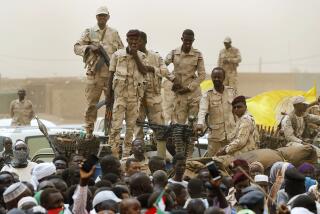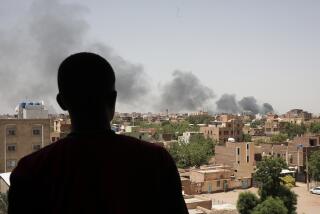Sudan Exempted by U.S. From Terrorism Act
- Share via
WASHINGTON — Four months after President Clinton signed a law last year barring financial transactions between American corporations and countries accused of supporting terrorism, the administration quietly exempted one such country--Sudan--where Occidental Petroleum Corp. was seeking a stake in a $930-million oil deal, according to federal officials and documents.
The August exemption to the 1996 Anti-Terrorism Act, which Clinton had signed with much fanfare in April, cleared the way for Los Angeles-based Occidental to negotiate with the Khartoum government despite the administration’s avowed policy of restricting U.S. commerce with the seven nations blacklisted by the State Department for allegedly supporting terrorists. Two years ago, for example, Clinton forbade any U.S. oil company transactions with Iran.
Administration officials had long described Sudan as second only to Iran as a staging ground for Islamic extremists involved in subverting neighboring pro-U.S. governments. The U.S. government accused Sudan of involvement in an attempt to assassinate Egyptian President Hosni Mubarak in 1995 and has pressed for tougher U.N. sanctions against Khartoum.
A State Department official, who spoke only on condition of anonymity, said the exemption for Sudan--and a similar exemption for Syria, also put into effect in August--does not undercut the Anti-Terrorism Act. Section 321 of the law bars U.S. citizens and companies from financial dealings with terror-sanctioning countries; violators are subject to up to 10 years in prison. However, the law also permits the Treasury Department to grant exemptions, which occurred in the case of Sudan and Syria on Aug. 23.
Officials said the Syrian exemption was intended to encourage participation by Damascus in the Middle East peace process, although Rep. Benjamin A. Gilman (R-N.Y.), chairman of the House Committee on International Relations, protested the “special loophole” in a letter to Clinton last fall and urged equal treatment for all “rogue regimes.”
In the case of Sudan, the sequence of events leading to the exemption remains unclear. State Department officials acknowledge discussing the issue last summer with both Occidental Petroleum and its potential partner in the Sudan deal, Canada’s Arakis Energy Corp. Occidental, founded in 1920 and taken over by industrialist Armand Hammer in 1956, is an $18-billion corporation that moved into the front rank of world oil giants after exploiting a huge, risky field in Libya in the 1960s.
Occidental executives declined to comment Wednesday night.
“We do not as a matter of policy respond to rumors or speculation,” said Roger Gillot, an Occidental spokesman in Los Angeles.
Occidental has long been active in local and national politics. Federal Election Commission records show the company and its political action committees donated more than $600,000 to national political parties in the last two years, almost evenly divided between the Democratic and Republican parties, including a $100,000 donation to the Democrats last March 29. Senior company executives also donated nearly $100,000 to candidates, parties and political action committees in the last two years, according to federal records.
The exemption allowed Occidental to join Arakis in pursuing the development of a promising but abandoned oil field in southern Sudan containing an estimated 3.5 billion barrels. The anticipated yield of 150,000 barrels a day by 1999 is expected to provide a cash windfall for the radical Muslim regime in one of the world’s poorest countries, according to industry analysts.
But Occidental’s hopes of tapping the Sudanese oil field suffered a setback in late November when the Khartoum government abruptly excluded the U.S. company from the development consortium, according to oil industry and U.S. government sources. The government reportedly was angered by a disclosure in the Washington Post that the Clinton administration was providing military assistance to three African nations supporting Sudanese rebels, the sources added.
Southern Sudan has been wracked by sporadic but seemingly intractable warfare for much of the past four decades. Rebel guerrilla forces drawn from the region’s mostly black and Christian or animist population have been fighting for autonomy or outright independence from the Khartoum government, which is controlled by the Muslim Arabs who predominate in northern Sudan. Since 1972, when the war resumed after a decade of peace, more than a million lives have been lost to fighting and famine.
Despite repeated calls to the company’s California headquarters and Washington office, Occidental officials declined to comment. National Security Council officials did not respond to repeated requests for comment. A spokeswoman for the Democratic National Committee said: “Occidental has a long history of giving to Democrats. Our people had no knowledge of the [anti-terrorism] legislation.”
A Treasury Department official had no comment other than to say that the August exemption was supported by the State Department. Stephanie Eicher, a State Department spokeswoman, said Wednesday night that the department had “no immediate comment.”
* Times correspondent Karen Kaplan contributed to this report.
More to Read
Sign up for Essential California
The most important California stories and recommendations in your inbox every morning.
You may occasionally receive promotional content from the Los Angeles Times.













